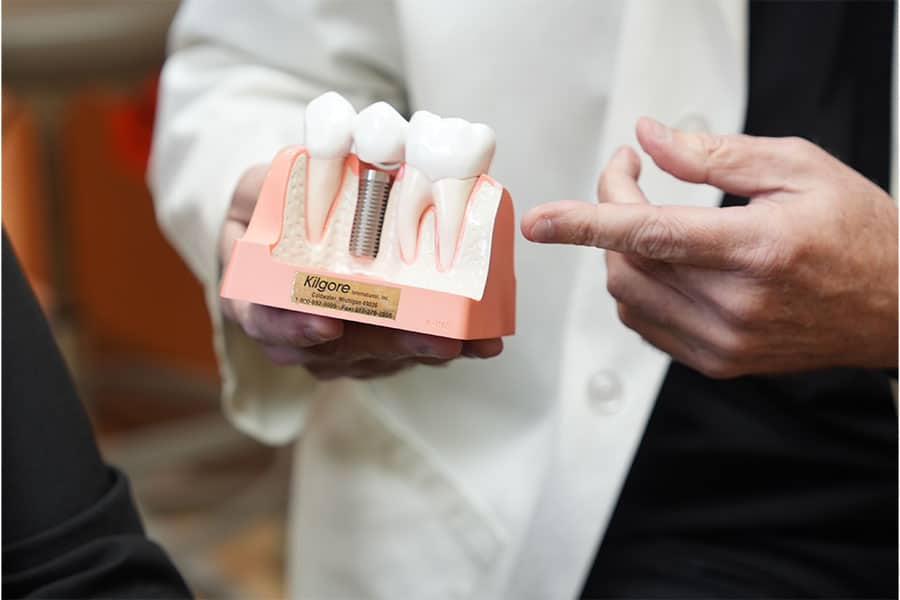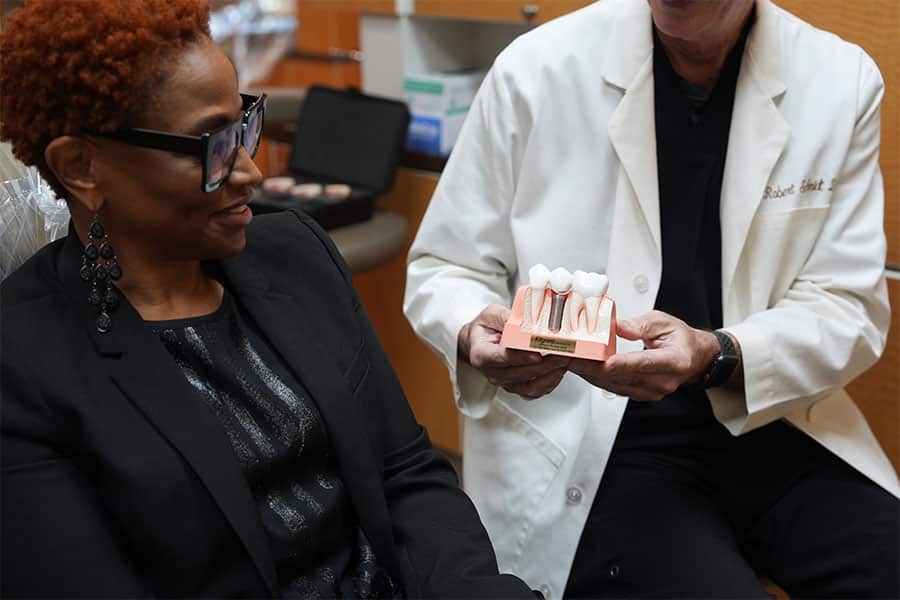- New Patient Special
- Serving the Atlanta Metro and Midtown Area since 1982
- (404) 600-1446
Dental implants not only fill gaps in your smile but also prevent the bone loss that occurs when a tooth is lost. Because the titanium post fuses with the bone, it halts the deterioration process. Therefore, implants are often a superior choice compared to traditional bridges or dentures.

When a tooth is missing, bone loss begins, which can eventually alter the structure of your face, causing it to sink inward. Dental implants help combat this issue by providing the necessary stimulation to the jawbone, preserving its health, and maintaining facial structure.
Once placed, dental implants closely mimic the appearance and feel of natural teeth. After the implant integrates fully with the jawbone, you can enjoy eating your favorite foods with the same efficiency as with natural teeth. Moreover, dental implants are easy to maintain, requiring only regular brushing and flossing.

We offer various financing options and accept most insurance plans to make dental implants more affordable. Flexible payment plans are available to help ease the financial burden and ensure you receive the care you need.
Enhanced Comfort and Function
Dental implants provide a stable foundation for replacement teeth. As a result, they offer greater comfort and functionality compared to traditional dentures. Additionally, this stability improves your overall daily experience.
Improved Speech
Implants contribute to clearer speech, unlike removable dentures. You can speak with greater ease and confidence, leading to a more natural and comfortable speaking experience.
Better Oral Health
Implants do not require alteration of adjacent teeth, as traditional bridges do. Consequently, they help preserve your oral health more effectively. Additionally, they simplify maintaining a healthy mouth.
Aesthetic Benefits
Dental implants are crafted to replicate the appearance and feel of natural teeth. Thus, they enhance your smile and boost your self-confidence. Furthermore, you can enjoy a natural-looking smile that complements your features.

To make an appointment, call (404) 800‑1442 or click here to request an appointment online.

Satisfied Client
"I had tiny cracks in my front two teeth. The doctor was so friendly and accommodating throughout the whole process. She wanted my teeth to look perfect—up to my standards. The staff fit me in when it was convenient for me. My teeth look and feel amazing now! I have more confidence, a brighter smile and more ease of eating.”
Satisfied Client
"I am very impressed with the treatment and the follow-up and care after the work is done. What I liked best was the beautiful smile after all the work was done. I have a trouble-free smile that has brought me numerous compliments and is very functional. It has basically given more confidence and I can eat most anything I want to eat.”
Satisfied Client
"If I ever moved, I think I would fly here for my dentistry! It has a lot to do with how expert the dentists are. They do the injection in the exact area. Unlike in the past, people can’t even tell when I have been to the dentist as my lip where I had the injection looks completely normal"
Satisfied Client
"I had a terrible toothache over the weekend and called Atlanta Dental Center first thing Monday morning. They got me in right away, and the dentist was so gentle and thorough. I left pain-free and very grateful!"
Satisfied Client
“I was always self-conscious about my gummy smile, but after just one laser treatment, my confidence soared. The procedure was quick and painless, the results are fantastic!”
Satisfied Client
“The laser gum treatment at Atlanta Dental Center was a game-changer for me. No pain, no stitches, and I love my new smile!”
Satisfied Client
"I used to wake up feeling exhausted every morning, no matter how long I slept. After getting my oral appliance from Atlanta Dental Center, I’m finally getting the restful sleep I need. I feel more energetic and alert during the day, and my snoring has stopped completely. Thank you!"
Satisfied Client
"I had a terrible toothache over the weekend and called Atlanta Dental Center first thing Monday morning. They got me in right away, and the dentist was so gentle and thorough. I left pain-free and very grateful!"
Satisfied Client
"When my son knocked out his front tooth during a soccer game, we rushed to Atlanta Dental Center. The team was amazing—they reinserted the tooth, and my son is doing great now. I can’t thank them enough!"
Satisfied Client
"Fastbraces® changed my life—I saw results in just 4 months! I couldn’t be happier with my new smile."
Satisfied Client

"I needed to replace three teeth and was told that the best way to go would be with dental implants. At first I thought, ‘they’re going to drill into my jawbone.’ But actually it was so precise that it ended up being a quick and very comfortable procedure."